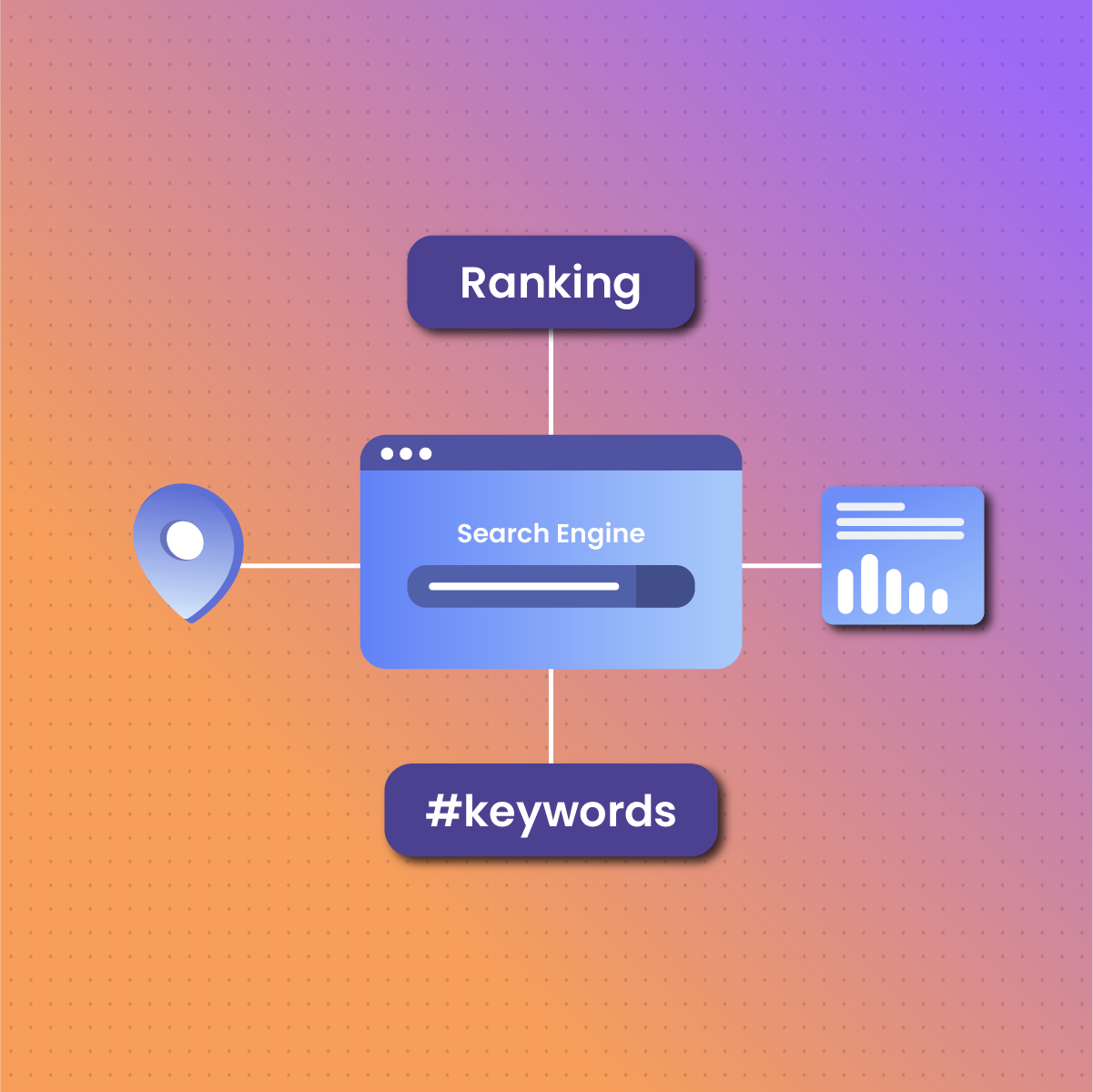Introduction
Data is critical to the operations of a business, whether on a small or large scale. Making crucial business decisions without facts supporting your actions is impossible. The internet is a treasure chest of data, which you can access with search engines.
However, search engines like Google, Yahoo, and Bing do not particularly like it when people try to get critical data. This is where search engine scraper comes in. According to Statista, search volume accounted for about 29% of all website traffic from various places in the world.
Therefore, it is essential to examine search engine scraper, its applications, challenges, and Netnut’s solution.
Let’s get into it!3
6
What is Search Engine Scraping?
Search engine scraping is collecting data, including images, texts, URLs, and others from search engines. This method of data scraping is exclusive to search engine result pages.
Search engine scraping is a type of web scraping– this process is usually automated as manually extracting search engine data may be time-consuming and prone to human errors.
Since search engine scraping is automated, you can collect data from multiple online pages in a few matters. This is a rather effective alternative to visiting each web page and manually copying and pasting data.
What is a Search Engine Scraper?
The Search engine scraper is a program that allows you to collect data from search engines. You may need a search engine result page (SERP) scraper to extract data from search engine result pages. This tool sends a request and receives an output, which is a list of results returned by the search engine query.
Search engine scraping tool sends an HTTP request to search engines, analyses the accessible data as HTML files, and delivers it in a structured format. A search engine scrapers may be programmed to extract all the data on a page. Some others can target specific information across multiple web pages.
Best Practices for Search Engine Scraper
Search engine scraper has many applications for businesses. However, extracting the data with a search engine scraper can be challenging. Search engines do not like bots such as scrapers. Therefore, search engines employ complex techniques to identify and block a search engine scraper.
What can be done since we have established that data is critical for business operations? You can employ some strategies to avoid getting blocked. Some of those techniques include:
HTTP cookies management: One such practice for using a search engine scraper is to clear or disable HTTP cookies every time you change your IP address. Keep track of what works best for the search engine scraper.
Modify the most common HTTP headers and fingerprints: Adjusting the most common HTTP headers and fingerprints is an excellent technique. Although often overlooked, it can significantly reduce the chances of a search engine scraper getting blocked.
Optimize the scraping process: A common mistake when using a search engine scraper is sending many requests to the server. Although the scrapers are meant to automate and streamline the process of data extraction, they can trigger anti-bot measures. Therefore, your IP will be flagged and most likely blocked if you attempt to scrape large quantities of data at once.
Rotate IP address: Rotating IP address is another strategy to help you avoid getting blocked when using a search engine scraper. Do not make the mistake of using the same IP address to collect data from search engines for an extended period. Alternatively, use IP rotation to bounce your IP address around to avoid being banned.
Use proxies with search engine scrapers: One of the best practices for using a search engine scraper is integrating them with proxies. Proxies are intermediaries between your search engine scraper and the search engine. It works by assigning you different IP addresses, which makes it difficult to identify and be blocked. In addition, choosing the right proxy solution for your search engine scraper is a priority.
Application of Search Engine Scraper
This part of the guide will examine some of the reasons why your business needs to employ a search engine scraper. They include:
Search Engine Result (SERP) scraping
SEO has become the heart of digital marketing. However, a successful SEO campaign relies heavily on data, including keywords, link-building, or competitors’ strategies. To achieve this, you must utilize a search engine scraper to collect data from SERP- home to public data, including keywords, meta-tags, meta-descriptions, and others.
Businesses can use a search engine scraper to gather keywords to help them rank in Search Engine Result Pages (SERP). Consequently, understanding the impact of SERP practices can help businesses decide if a strategy is worth it.
Businesses scrape SERP data to confirm if search terms produce what they expect. Therefore, analyzing this information can bring value, including a guideline that works best for search engine result page results. This result can help them modify their SEO strategy so that they
Image scraping
Image scraping is another application of search engine scraper that is critical for optimizing SEO strategies and brand protection. Retrieving product images can help businesses identify if there is a fake product on the internet. This is an important strategy for brand protection.
Businesses can also gather images and their information for SEO purposes to optimize their images for search engine result ranking. For example, a search engine scraper can collect data on the ALT texts of photos. This result is critical as it reveals the keywords used with the image and how they help it rank on the search engine result page.
Shopping result scraping
Collecting data from shopping results pages is another critical use of a search engine scraper. The shopping results page contains high-level data, including prices, product descriptions, titles, and reviews. Businesses can use this data to learn about competitors’ branding and pricing, which can inform their marketing strategies.
In addition, using a search engine scraper to obtain data from the shopping results page provides critical information for optimizing your pricing based on factors like competitor pricing, market sentiment, demand, and trends.
News results scraping
Since the world has gone digital, News platforms have also adapted. They are integrated into search engines and provide an excellent source of information. Therefore, people can access all the latest information from various news platforms in one place. You can use a search engine scraper to collect data from this publicly available database for various applications.
Search engines have become a news hub. As a result, brands can analyze the data to understand the latest trends across various industries and how news is shown differently in different parts of the world. They can access trends based on location, keywords, titles, and more. The number of news platforms from all the countries of the world is numerous, so using a search engine scraper optimizes the process of analyzing large volumes of news.
Brand protection
Another practical application of a search engine scraper is brand protection. Many businesses invest time and money to build their brands over the years. Therefore, protecting the integrity of brands is becoming increasingly significant.
In addition, when businesses take proactive approaches to protect their brands, it fosters trust and invokes a greater sense of safety in the customers. Some businesses use a search engine scraper to identify imitation or the use of their brand items, including content, videos, and images, without permission.
Digital Marketing
Digital marketers can leverage a search engine scraper to track specific ad characteristics. Likewise, you can track your competitor’s ads and get data that informs you why it performs better than your brand. You can leverage a search engine scraper to compare your marketing strategies with the top brands in the industry.
A search engine scraper reveals data that allows marketers to determine the efficiency of digital marketing strategies. This allows them to get insight into market trends, stay informed, and curate digital marketing strategies that give your business a competitive advantage.
The core of digital marketing is content- articles, images, videos, keywords, and more. You can use a search engine scraper to get details about content strategies, their efficiency, and how they can be optimized. Consequently, this may increase visibility and conversion rates.
Competitive Analysis
Another critical application of a search engine scraper is competitive analysis. Almost all industries are competitive, and you need data to stay at the top of the game. This is where competitive analysis with a search engine scraper becomes necessary. Most businesses use a search engine scraper to see what their competitors are doing.
When you scrape data from competitors’ pages, you can get meaningful insights, including social media strategies, marketing strategies, or how they optimize the description of their best-selling products. As a result, the data can help you predict trends and marketing patterns, which plays a significant role in decision-making. Therefore, you can use a search engine scraper to get a competitive advantage.
Challenges Faced by Search Engine Scraper
Getting data with a search engine scraper offers significant value to businesses. However, it comes with some challenges that make the process complicated. The primary setback is that the algorithm cannot differentiate between good and malicious bots. Therefore, search engines often mistake scrapers for malicious bots, which makes blocking inevitable.
Here are some of the challenges that your search engine scraper can encounter:
CAPTCHAs
CAPTCHAs are a popular security measure on many websites. The irony of this technique is a bot determines if you are “human folk” or “bot-folk.” A CAPTCHA test pops up when the search engine anti-bot system is triggered. It often includes identifying objects, positions, or colors in an image.
A simple bot will fail this test, causing the IP address to be blocked. However, if your search engine scraper is very advanced, it can pass the test and bypass IP bans.
Unstructured data
The result of a search engine scraper depends on how you write the code. Successful access to search engine result page data is not the end of it all. The data collected by a search engine scraper must be structured such that it is easy to read and understand. Therefore, carefully consider which format you want the data to be returned in before choosing a search engine scraper.
IP blocks
IP blocks are possibly the biggest challenges when using a search engine scraper. They can trigger a chain reaction of unpleasant events. When search engines block your IP, you cannot access critical data, which may lead to tension and frustration.
Search engines can identify your IP address when you use a search engine scraper. The search engine scraper sends many requests to the search engine. If all these numerous requests keep coming from the same IP address, search engines will block it as the activity is not similar to that of a regular user.
NetNut’s Solution for optimizing search engine scraper
We have examined the challenges associated with using a search engine scraper as well as best practices for using them. However, sticking to these best practices is not always 100% effective in overcoming challenges associated with a search engine scraper.
NetNut has a specialized solution- SERP Scraper API, which is designed to provide an easier and more effective solution for search engine result page data extraction. This tool is useful for extracting a lot of real-time public data from search engines. NetNut SERP Scraper API is an invaluable tool in brand protection, ads data tracking, and keyword data collection.
Here are the things you can do with NetNut’s SERP Scraper API:
Extract valuable data from SERP with search engine scraper
NetNut’s SERP Scraper API allows you to collect critical data, including images, news, keywords, advertisements, and others. These data are useful to protect your brand integrity by identifying counterfeit and optimizing your SEO strategies.
Collect data from any country across the globe
You can use the SERP Scraper API to collect data from any location in the world. It allows you to bypass geographical restrictions, allowing you to access relevant data without any hindrances. With over 200 ISP partners, it supports granular targeting down to city/state levels and all languages.
Get structured data
Another reason to use SERP Scraper API is to get structured data. You don’t have to struggle with disorganized datasheets. Instead, you can specify the format you want the data to make analysis easier. In addition, you can retrieve customized data in JSON or HTML format via our API.
Bypass CAPTCHAs and IP blocks
CAPTCHAs and IP blocks are two of the most common challenges with a search engine scraper. However, with NetNut SERP Scraper API, you can bypass these anti-scraping measures with ease. Therefore, the API is ideal for large projects offering speedy data collection. Consequently, with no obstacles, your SERP scraping activities become streamlined, and you can make informed decisions quickly.
Store data from search engine scraper
It is not enough to just use a search engine scraper to extract data. You also need to store it in a secure location. After the data extraction is complete, the results will be delivered to your cloud storage. However, if you have a preferred storage type, we can always tailor a customized solution to meet your search engine scraping needs.
Conclusion
Search engines are a warehouse of data, and most are accessible to the public. However, you need a search engine scraper to automate the process of extracting and storing the data. This data helps businesses remain competitive and informs their pricing, digital marketing strategies as well as SEO strategies that can help them stay relevant on search engine result pages.
Using a search engine scraper comes with unique challenges that can be very tiresome. However, you can optimize the use of search engine scrapers by integrating them with SERP Scraper API.
Do you want to experience industry-leading search engine scraping? Or do you need more information on how a search engine scraper can be integrated with API for your scraping needs? Contact NetNut today to get started!
Frequently Asked Questions
Is it legal to use a search engine scraper?
This question is highly controversial as data remains extremely valuable for businesses. However, websites are trying to protect their customer’s data because it may be misused by the wrong people.
Using search engine scraper is legal when it does not breach any laws on the website. Therefore, it is necessary to read the Terms and Conditions as well as the Robot.txt file on a website to understand the extent of scraping allowed.
H3: What kind of data can I get from NetNut SERP Scraper API?
You can get various data from search engines using the SERP Scraper API. They include:
- Images such as product images, ALT texts
- News including the latest trends from various industries
- Videos including description, title, video ID, and more
- Shopping data such as keyword, product description, pricing, competitor analysis, and more
- Finance including financial news, stock data, competitor financial data
- Flight data such as prices, number of flights, successful flights by a particular airline, and more.
How does NetNut SERP Scraper API work?
The steps for search engine scraping with SERP Scraper API are quite straightforward.
First, the client sends an HTTP connection request to the target search engine (for example, Google) to access its content. Then, the SERP API receives the client request and uses the “get” command to forward it to the target search engine.
The search engine responds by providing the data indicated in the “get” request. Integrating search engine scrapers with the API helps to bypass anti-scraping techniques like CAPTCHAs.







